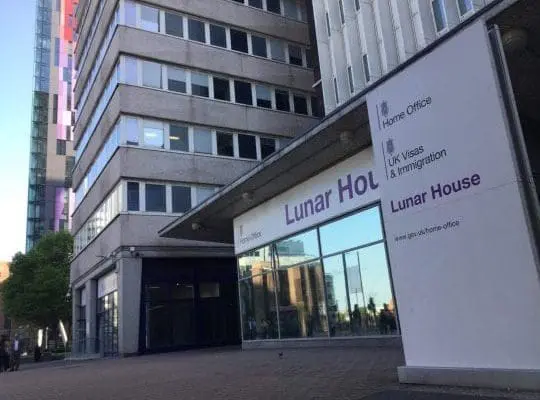What Happens If You Are Refused Asylum in The UK
Applying for asylum in the UK can be a complex and stressful process. If your application is refused, it can feel overwhelming, but it is important to understand your options.
IAS can provide legal support and help you work out your next steps. Call us today at +44 (0)333 414 9244 for expert advice.
Read our 1001 reviews
What Happens If You Are Refused Asylum in the UK?
When your asylum application is refused, you will receive an asylum refusal letter from the Home Office. This will give you the reasons for the refusal, and depending on your circumstances, you may have the right to appeal the decision or explore other legal avenues.
If you plan to appeal the decision or need support in reapplying for asylum, you should seek the advice of an immigration expert.
Appealing an Asylum Refusal
If your asylum application is refused, you may have the right to appeal the decision. The right to appeal depends on the specifics of your case and the reasons for refusal.
In some cases, you may receive a refusal with no right of appeal, which means you will need to explore other options, such as submitting a fresh claim or requesting a judicial review.
If you are granted the right to appeal, you must follow the correct appeal process and lodge your appeal within 14 days of receiving the refusal letter if you are in the UK. The appeal will be heard by the First-tier Tribunal (Immigration and Asylum Chamber). It is crucial to seek legal advice to ensure your appeal is well-prepared and supported by substantial evidence.
If your refusal letter states that you have no right of appeal, you may still be able to challenge the decision through a judicial review or by submitting a fresh claim with new evidence.
Financial Support and Housing for Refused Asylum Seekers
If your asylum application is refused, you may still be eligible for limited financial support and housing assistance, depending on your circumstances.
Refused asylum seekers can apply for Section 4 support under the Immigration and Asylum Act 1999.
This support is available if you meet one of the following criteria:
- You are taking steps to leave the UK voluntarily.
- You are unable to leave the UK due to circumstances beyond your control (e.g., medical reasons).
- You have applied for judicial review and are awaiting a decision.
Section 4 support provides a weekly allowance of £45 per person, which is usually loaded onto a payment card. This support is intended to cover essential living costs.
Housing Assistance
Refused asylum seekers who qualify for Section 4 support may also be provided with accommodation. This accommodation is usually basic and shared. It is intended to prevent destitution while you explore your options.
Refused asylum seekers who are destitute or at risk of homelessness can seek assistance from housing charities and organisations. These services provide temporary accommodation and support to help you stay safe.
Healthcare Access
Refused asylum seekers are entitled to access certain healthcare services in the UK, even after their application has been denied.
There are several organisations, such as Medact, that can help refused asylum seekers understand their healthcare rights and access the services they need.
Consequences of Asylum Refusal in the UK
Being refused asylum in the UK can have significant legal and practical consequences, such as:
Loss of rights and access to services – once your asylum application is refused, you lose your right to work, study, or access most public funds. You may also lose access to healthcare, except for emergency treatment and certain services, such as maternity care.
Risk of deportation – failed asylum seekers are at risk of being deported to their country of origin. The Home Office may issue a removal notice, requiring you to leave the UK voluntarily or face enforced removal. If you fail to comply, you could be detained in an immigration removal centre.
Detention – in some cases, refused asylum seekers may be detained while awaiting deportation. Detention is typically used as a last resort, but it can happen if the Home Office believes there is a risk of you absconding.
Voluntary Return Programmes for Failed Asylum Seekers
If your asylum application has been refused and you cannot remain in the UK, you may consider returning to your home country voluntarily.
Voluntary return programmes are designed to help individuals who choose to leave the UK without facing enforced removal. These programmes offer practical and financial support to ensure a smoother transition back to your country of origin.
How Can IAS Asylum Lawyers Help?
At IAS, we understand how challenging it can be to navigate the asylum process, especially after a refusal. Our team of experienced asylum lawyers can provide expert legal advice and representation to help you:
- Appeal an asylum refusal.
- Submit a fresh claim with new evidence.
- Apply for judicial review.
- Access financial and housing support.
We offer legal aid and private asylum support, ensuring that our services are accessible to everyone. If you’ve been refused asylum, do not face it alone. Call us today at +44 (0)333 414 9244 to discuss your case.
Table of Contents
Table of Contents will appear here.Legal Disclaimer
The information provided is for general informational purposes only and does not constitute legal advice. While we make every effort to ensure accuracy, the law may change, and the information may not reflect the most current legal developments. No warranty is given regarding the accuracy or completeness of the information, and we do not accept liability in such cases. We recommend consulting with a qualified lawyer at Immigration Advice Service before making any decisions based on the content provided.
Services we Provide
Frequently Asked Questions
Failed asylum seekers with children may still be eligible for Section 4 support, including financial assistance and accommodation. Children are also entitled to access education while in the UK.
No, failed asylum seekers are not permitted to work in the UK unless they have been granted permission under exceptional circumstances, such as their case having been pending for more than a year and the role being eligible.
Failed asylum seekers can access emergency healthcare and certain services, such as maternity care and HIV treatment, but most other healthcare services are not available.
Pregnant failed asylum seekers may be eligible for Section 4 support, including financial assistance and accommodation. They are also entitled to access maternity care.
Failed asylum seekers may explore options such as submitting a fresh claim, applying for judicial review, or seeking voluntary return assistance.
Failed asylum seekers are typically notified of deportation through a removal notice issued by the Home Office.
Yes, legal assistance can be invaluable in challenging an asylum refusal. A qualified immigration lawyer can help you appeal the decision, submit a fresh claim, or apply for judicial review.

























